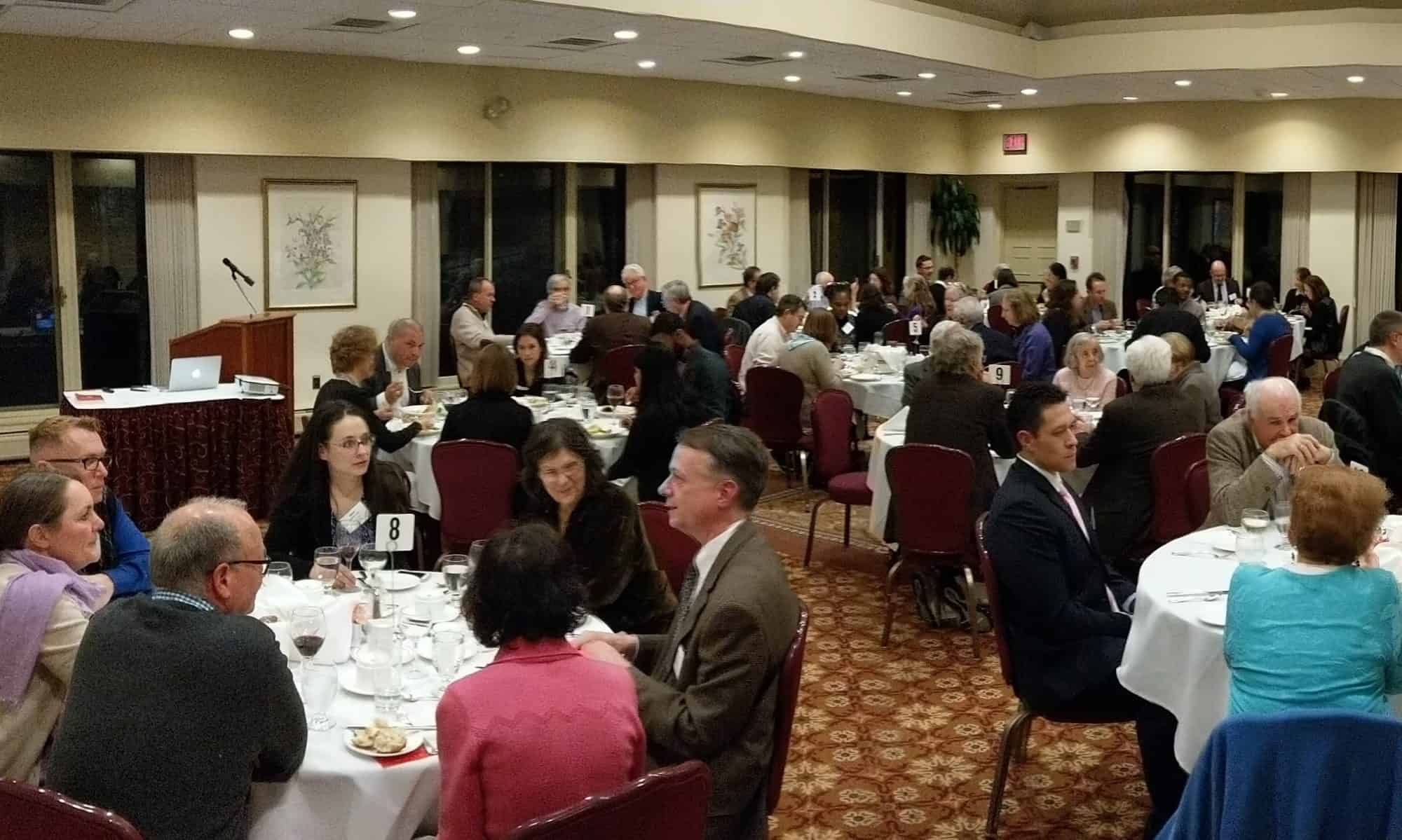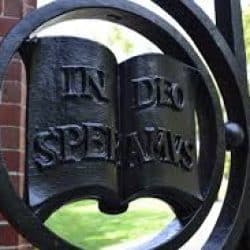For our event on Feb. 1st, 2023:
- Chapters 22-23 from Dr. Arun Singh’s latest book, Your Heart, My Hands
For our event on Dec. 7, 2022:
-
“Hypertextuality of an hyperextended synthesis: on the interpretation of theories by means of selective quotation” by David Haig.
In this brief overview, Haig discusses the purpose of his latest book, From Darwin to Derrida (MIT Press, 2020), and the need to acknowledge and address “teleophobia” within the field of evolutionary biology.
-
“The Historical Adam” by William Lane Craig, First Things, October, 2021
In this summary of his new book, In Quest of the Historical Adam (Eerdman’s Publishing, 2021), William Lane Craig uses archeological evidence to provide a snapshot of how the account of the creation in the biblical book of Genesis fits into its Ancient Near Eastern context and where a “Historical Adam” might be found along the timeline of human evolution.
For our event on Oct. 18, 2022:
- Harvard Business Review: ‘The Dark Side of Resilience‘ by Tomas Chamorro-Premuzic & Derek Lusk
- Harvard Business Review: ‘To Handle Increased Stress, Build Your Resilience‘ by Ama & Stephanie Martson
For the virtual event on Jan. 19, 2022:
-
NYTimes Opinion, Can Religion Guide the Ethics of AI? Or Can Silicon Valley Find God? by Linda Kinstler (general)
-
Vox, Robot priests can bless you, advise you, and even perform your funeral, by Sigal Samuel (general)
-
BBC (12 min), God and robots: Will AI transform religion?
-
Ted Talk (16 min), What happens when our computers get smarter than we are?, by Nick Bostrom (Oxford | Professor of Applied Ethics; Director, Oxford Future of Humanity Institute; Director, Oxford Martin Programme on the Impacts of Future Technology)
Even more readings and resources:
-
Cosmology Today (20 min), 2029 : Singularity Year – Neil deGrasse Tyson & Ray Kurzweil
-
Ted X Talk (20 min), A New Philosophy on Artificial Intelligence by Kristian Hammond (Northwestern | Professor of computer science and journalism; Founded the University of Chicago’s Artificial Intelligence Laboratory)
-
The Humanist, The Relationship of Artificial Intelligence and Religion to Secular Morality, by Gordon Gamm (a Humanist perspective)
-
Wired, Muslim scholars are working to reconcile Islam and AI by Sparsh Ahuja (a Muslim Perspective)
-
The Atlantic, Is AI a Threat to Christianity? By Jonathan Merritt (a Christian Perspective)
For our event on Nov. 2nd, 2021:
- Peruse Professor Gates’ website to see some of his articles, publications, and talks.
- “Why Theoretical Physicist Jim Gates Sees No Conflict Between Science and Religion” (Smithsonian Magazine)
- Here are two short videos with Prof. Gates on faith and science and Truth vs. Accuracy.
- The Uncertainty of Disbelief
For our event on June 17th, 2021:
- Watch this video or read the transcript of George Church talking about his research lab and his efforts to protect humans from viruses, genetic diseases, and aging.
- Watch this 5 minute video of George Church on 60 Minutes
- James Sherley has been focused on adult stem technology, but a few years back he wrote about these opinion pieces in the Boston Globe: “Stop the Cloning Madness” and “Crossing Line on Cloning“
- Opinion by George Church in the Washington Post: “Eight Questions to Ask Before Human Genetic Engineering Goes Mainstream“
- TEDxBeaconStreetSalon talk by George Church on “Reversing Human Aging” (20 minutes)
- Jeantine Lunshof conducts her philosophical and ethical work as a full-time ethicist on the work floor of the George Church Lab.
- 2020 Nobel Prize for Chemistry Laureate Jennifer Doudna, UC-Berkeley Biochemist, and Columbia University Oncologist Siddhartha Mukherjee discuss “The Future of Humans: Gene Editing & the Unthinkable Power to Control Evolution” (video, 84 minutes)
- The CRISPR Journal Vol. 3, No. 5, Perspective Free Access Reactions to the National Academies/Royal Society Report on Heritable Human Genome Editing; See George Church: “Germline versus somatic debate” (among other profitable readings)
- https://www.personalgenomes.org/
- Personal Genetics Education Project
For our event on January 27th, 2021:
- Scientific Explanations for the Mind and Religious Belief – Tania Lombrozo discusses scientific explanations for the mind and religious belief. (~18 minute video)
- Religion and the Brain: A Debate – Does evolution explain why the human brain supports religious belief? Dimitrios Kapogiannis and Jordan Grafman, follow up on a recent scientific paper by stating that brain networks that evolved for other purposes have given rise to our capacity for religious belief and experience. Andrew Newberg, the radiologist and psychiatrist who wrote How God Changes Your Brain, takes a different approach. He argues that the brain may be an instrument of religious experience but is not necessarily the origin of that experience. Each side of the debate first wrote a position statement; the sides then exchanged statements and wrote rejoinders. (~17 pages if printed)
- Does Evolutionary Psychology Undermine Religion? – A Closer to Truth interview with Justin Barrett. Description: Evolutionary psychology naturalizes religion. It seeks to explain elements of mind by selection and survival over time. Take altruism—individuals sacrificing themselves for the good of the group. Can humanity’s entire religion project be explained similarly? Does religion, its social systems and personal behaviors, generate favorable selection and survival? (~9 minute video)
- How Does Curiosity Impact the Sciences? – 90-minute panel discussion with experimental psychologist Tania Lombrozo, physicist Marcelo Gleiser, and physician Gavin Francis
- How Do Brains Represent Beliefs About God – Summary of 3-year Templeton study led by Jordan Grafman and others
- Blueprint 1543 – Organization co-led by Justin Barrett that integrates faith and science through producing scholarship, equipping scientists, and developing leaders.
For our event on November 12, 2020:
- Elaine Ecklund interview regarding her recent book, Secularity & Science.
For our event on November 12, 2018:
- Innovation Hub: “Computers That Can Read Your Emotions”
- WIRED magazine article, “Welcome to Rosalind Picard’s touchy-feely world of emphatic tech”
- Rosalind Picard’s current and previous projects
For our event on October 1, 2018:
- Online resources from Dr. Flanigan’s undergraduate seminar on CS Lewis.
For our event on March 7, 2018:
- Presentation slides
- Publishers Weekly brief summary of Miller’s book, The Human Instinct
- Prologue and Chapter 1 of Miller’s book, The Human Instinct
For our event on February 13, 2018:
For our event on October 26, 2017 from Elsevier’s Neuroscience and Biobehavioral Reviews, Official Journal of International Behavioral Neuroscience Society:
- Dr. Curt LaFrance’s presentation
- “Impications of spiritual experiences to the understanding of mind-brain relationship” by Alexander Moreira-Almeida
- “Brain mechanisms in religion and spirituality: An integrative predictive processing framework” by Michiel van Elk and Andre Aleman
For our event on March 8, 2017:
- NYTimes article: “I’m right! (For Some Reason)” – published Oct. 19, 2016
- NYTimes article: “Why We Believe Obvious Untruths” – published Mar. 3, 2017
Readings for Nov. 1st, 2016 event:
Dear Roundtable participant, please read these three short pdfs to be prepared for discussion Tuesday night, Nov 1st. In the first brief reading, George Church is co-featured, and we read these opening statements:
“The development of technology that allows human genes to be edited has stirred tremendous excitement about the potential for treating debilitating and life-threatening diseases. The technology could lead to drugs that would treat cancers and other diseases that currently are incurable. But another facet of this breakthrough has many scientists and others worried: the possibility that the genetic makeup of sperm and eggs could be edited so that diseases that can be inherited won’t be passed on to children yet to be born.
One concern is that gene editing that affects future generations, not just an individual, is too risky given our still incomplete understanding of the human genome and how changes might affect it. Another is that the ability to edit heritable traits could result in so-called designer babies, with parents choosing traits such as intelligence or physical characteristics. Others say we can meet those challenges, and the potential benefits are too great to pass up.”
In the second reading, we read Professor Church’s very brief comments on the discussion of the first reading.
Though the third reading is the longest, a taste for the content may be found in this excerpt from James Sherley:
“Because scientific knowledge is generally reputed to have a unique and ideal character of not only being produced by dispassionate observation, experimentation, and systematic reason but also being falsified by independent experimentation, it stands apart from all other forms of human intellectual creation in the likelihood that it will be mistaken as unprejudiced and infallible.
Unfortunately, because social and political adversaries often are equally unequipped to tell the difference, as a result of this accorded preeminence, the invocation of Science in public and political discourse on any topic garners sometimes excessive homage, including begrudging acquiescence, whether it is represented accurately or inaccurately.”
Preparation for the event on Monday, March 7th, 2016:
- “Can we know what is real?” (Chapter 24) in Marcelo Gleiser’s book, The Island of Knowledge
- Here are some reviewers’ comments on The Island of Knowledge.
- “Will we become God?” 6-minute video with Marcelo Gleiser on Through the Wormhole with Morgan Freeman.
- Click around Marcelo’s personal website to learn more about him and his work.
Here are the readings for the event on Oct. 1st, 2015:
In this one link you will find TWO readings that we are asking participants to include in their preparation for our Thursday Oct. 1 Roundtable featuring Professor Walter Bradley and ASA President Dr. Randy Isaac on the topic of Cosmological Constants – are they evidence for the existence of God?
With the permissions of the authors, the first reading is from Alan Lightman’s The Accidental Universe, chapter 1, recommended by Professor Bradley. The second reading is from Amir D. Aczel’s Why Science Does Not Disprove God, chapter 11, Between God and the Anthropic Principle, recommended by Dr. Isaac.
More of the pre-event readings for the April 27th roundtable event are coming soon.
- “Islam, Fatalism, and Medical Intervention” by Sherine Hamdy
- Notes and related readings from Andrew Foster
Learn more about the presenters here:
Here are the pre-event readings for the April 6th roundtable event:
- Monopolizing Knowledge by Ian Hutchinson – Chapter 1
- “The Genius and Faith of Faraday and Maxwell” by Ian Hutchinson
- “Naturalizing God: Is prosocial religion good for you?” by Joachim Krueger
- “Belief is Not Evidence” by Joachim Krueger
Learn more about our presenters here:
Below are the pre-event readings for the October 28th roundtable event:
- “Secularity and the liberal arts: The good, the bad, and the ugly” by Prof. Cladis, The Imminent Frame
- “A Modest Proposal to Our Chaplains” by Prof. Goss, Faculty Bulletin, Feb. 1994
- “An Argument in Support of Traditional Commencement Prayers” by Prof. Miller, Faculty Bulletin, April 1994

